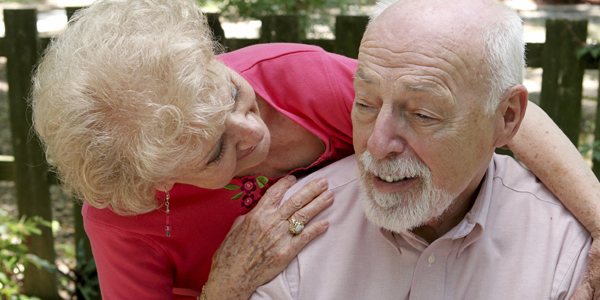Stress threatens health of spousal caregivers
News Release, Right at Home Canada, March 21, 2014Many of the approximately 1.1 million spousal caregivers in Canada today are facing a stress that they have never experienced before... caring for a loved one with dementia; a disease that is projected to double over the next several years. From frustrating situations of memory loss to dangerous situations of violence, caring for a disease like dementia can be overpowering. “These spousal caregivers always need to keep in mind, that it’s not the person, it is the illness, disease or disability that’s causing much of the stress and confusion” , says Dani DePetrillo, Vice President of Health Care Services.

A 2012 Statistics Canada study on “Caregivers in Canada” reported that half of those providing care to spouses (46%) showed at least five symptoms of psychological distress and feelings of isolation. Spousal caregivers were also more likely to sustain an injury while providing care. As care needs increase and the length of care stretches into months, years or even decades, a spousal caregiver also becomes vulnerable to other common, stress-related conditions such as anxiety, depression, headaches, backaches, fatigue and sleep deprivation. Resentment can also build against other family members who are not as readily available to help. DePetrillo suggests that, “there is only so much emotional wear and tear that a caregiver can take before they themselves will need care”.
How does it get to this state of affairs? Often, the spousal caregiver and the family are reluctant to bring in help. “There’s a lot of guilt and they can feel that they’re giving up on their loved one. Trust may also be a factor as they assume that no one can tend to their spouse’s health as well as they do. “It’s only natural to put ourselves in harm’s way for those we love”, says DePetrillo. “The reality is that most spousal caregivers do not recognize that they themselves are in harm’s way until it is too late. We get calls from the adult children saying, ‘Mom now needs temporary care and Dad needs ongoing care, can you please help?’ Many times the care that Mom needs is the direct result of the care she has been providing to Dad. What makes matters worse is that so often, the call is urgent, panicked and coming from the hospital.”
It’s important for families to recognize earlier in the process, the potential health risks posed to the spousal caregiver, so that children of Seniors are not suddenly faced with two dependent parents, instead of one. Fortunately, there are many community resources that can supplement or complement spousal care to help mitigate the stress. “We can help by either pointing the family to the right community service provider or by working with them directly to provide exactly what they need. There are public and private solutions in each community. It doesn’t need to be all or nothing”, says DePetrillo. “You just need to know and understand your options”.
Often the key is to identify immediate and sometimes even small steps that will relieve stress for the spousal caregiver. Perhaps all they need is a regular respite to recharge their batteries, run errands or do something to help them de-stress. A lack of sleep can also amplify any stressful situation and is often the quickest cause of deteriorated health. “Many spousal caregivers find our Night Support program quite invaluable. We care for their loved one during the night, allowing the spousal caregiver a full night’s rest. They’re reassured that we are there and alert”, says Dani DePetrillo.
Care assistance will allow the spousal caregiver to get the respite break they need for their own well-being, or return to a more normal routine that will help them maintain their own health. This not only impacts the caregiver, but frequently improves the physical and psychological well-being of the spouse requiring care. Those receiving care often feel they’re a burden to their loved ones and carry guilt and anxiety about the stress they’re putting on them. This sometimes leads to an emotional decision to leave the comfort of their home to be admitted into a facility to alleviate the burden. All of this can be avoided through the right care delivery in the comfort of their own home.
About
Right at Home Canada offers both non-medical and medical care to seniors and disabled adults who want to continue to live independently. Right at Home Canada offers a unique approach to care delivery including a Care Team that leads to a higher level of quality and home care experience. Each caregiver is thoroughly screened, trained and insured prior to entering a client’s home. Right at Home is a global organization with offices in Canada, the United States, China, Brazil, the UK, Ireland, Japan and Australia.
For further information, please contact:
Mark Goliger, COO – Right at Home Canada, 1-855-983-4663, [email protected] or visit www.rightathomecanada.com


